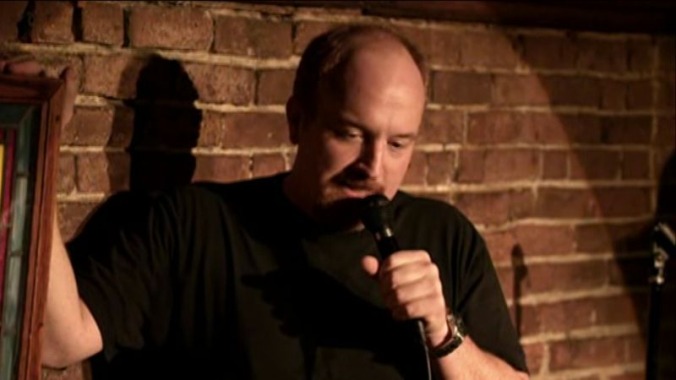Visiting the Comedy Cellar, the New York hub of Louie’s expanding universe
In the eyes of the viewing public and the voting bodies behind various TV accolades, Louie is a situation comedy—a situation comedy that challenges the conventions of the form, certainly, but one that is still predicated on episodic storytelling in which character + new scenario = laughs. Nervous laughs, painful laughs, knowing laughs because viewers have found themselves in a similar position and done the polite (i.e. non-Louie) thing—but laughs nonetheless.
But with its varying methods of filmmaking, its tendency to delve into the deeply absurd and/or tragically dramatic, and its loose relationship to continuity, Louie can be a different show from one week to the next. By working cheaply (and largely on his own), creator-star-writer-director-editor Louis C.K. set up a TV sandbox for himself, one that grants him 13 chances to make a different short film (or two different short films) per season—short films set in the same universe and employing a recurring cast of characters who deal with a rotating crop of topics and themes. Love, divorce, masculinity, depression, loneliness, success, fatherhood, dating, drinking, smoking, drugs, the elderly, motorcycle accidents, singing in the car, Woody Allen fetishism, the largely untapped comedic skills of David Lynch—the list goes on.
To encompass all of these factors, C.K. hasn’t limited himself to, say, the traditional sitcom setup of his short-lived HBO series, Lucky Louie. Certain attributes mark this Louie as a situation comedy, but at times, the show feels more like an anthology series, a comedic Twilight Zone where C.K. is both Rod Serling and the poor dope trapped in Serling’s latest flight of fancy. When C.K.’s onscreen alter ego is pining over/lusting after Pamela Adlon or chasing a daffy Parker Posey across New York City, Louie is a romantic comedy. When the series sends Louie on an overseas USO tour, it’s briefly an intimate military drama. And for 60 seconds of nearly every episode, as the camera follows Louie up the stairs from the West Fourth Street—Washington Square Subway station, down the streets of Greenwich Village, and then back underground to the cozy confines of the Comedy Cellar, Louie is a workplace sitcom.
The Comedy Cellar is the spoke around which Louie’s universe spins. In the real world, it’s been the hive of comedy activity in the Village for 31 years, hosting performances by Andy Kaufman and Robin Williams in its early days, then fostering a band of up-and-coming regulars, six of whom are now enshrined behind Plexiglas near the club’s interior entrance: Ray Romano, Dave Chappelle, Jon Stewart, Wanda Sykes, Darrell Hammond, and Colin Quinn. Speaking with The A.V. Club about C.K.’s choice to include the Comedy Cellar as one of his show’s bases of operation, longtime collaborator and Louie producer M. Blair Breard spoke of the venue in terms of its comforts and homeyness. There’s a lived-in quality to this “comedian’s comedy club,” a communal charm broadcast by the messages scrawled on the framed headshots that line its hallways.









































